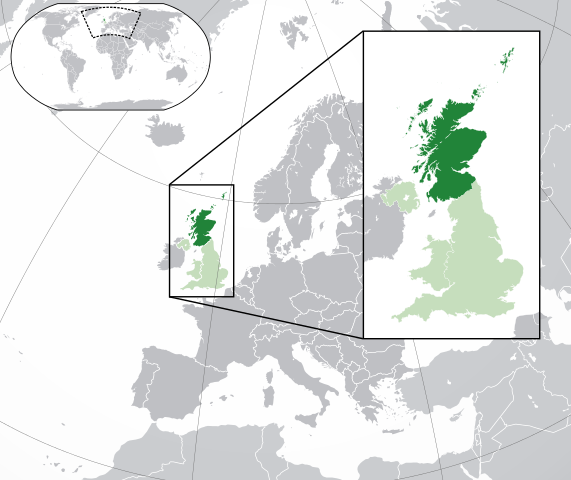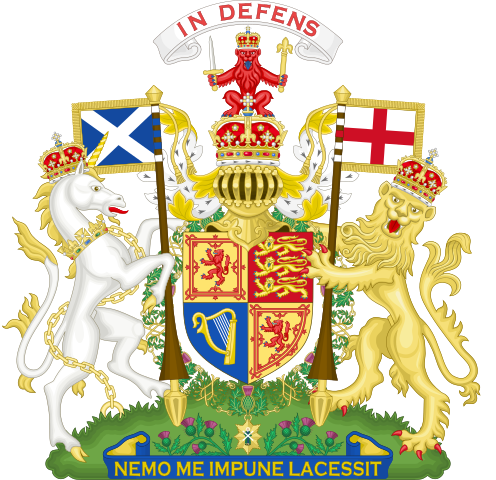General-KJ (talk | contribs) (Added categories) Tag: Visual edit |
General-KJ (talk | contribs) (Jacobite rebellions and highland ethnic cleansing) Tag: Visual edit |
||
| Line 1: | Line 1: | ||
{{Infobox country|name=Scotland|native_name=Alba|image_flag=Flag of Scotland.svg.png|image_coat=Royal Coat of Arms of the United Kingdom (Scotland).svg (1).png|capital=Edinburgh|largest_city=Glasgow|leader_title1=Monarch|leader_name1=[[Charles III]]|leader_title2=First Minister|leader_name2=[[Humza Yousaf]]|image_map=Scotland in the UK and Europe.svg.png|legislature=Scottish Parliament|area_km2=80,231|population_estimate=5,436,600|population_estimate_year=2022}} | {{Infobox country|name=Scotland|native_name=Alba|image_flag=Flag of Scotland.svg.png|image_coat=Royal Coat of Arms of the United Kingdom (Scotland).svg (1).png|capital=Edinburgh|largest_city=Glasgow|leader_title1=Monarch|leader_name1=[[Charles III]]|leader_title2=First Minister|leader_name2=[[Humza Yousaf]]|image_map=Scotland in the UK and Europe.svg.png|map_width=320px|legislature=Scottish Parliament|area_km2=80,231|population_estimate=5,436,600|population_estimate_year=2022}} | ||
'''Scotland''' is a constituent country of the [[United Kingdom of Great Britain and Northern Ireland|United Kingdom]] occupying the northern part of the island of Britain. Scotland is semi-autonomous, and has its own parliament but the [[British Parliament]] has supremacy over the Scottish.<ref name=":0">{{Web citation|newspaper=Scottish Parliament|title=What's the difference between the Scottish Parliament and the Scottish Government?|date=2023|url=https://www.parliament.scot/about/how-parliament-works/difference-between-parliament-and-government}}</ref> There are high levels of support for independence in Scotland but the British Government refuses to allow an independence referendum after the [[Scottish independance referendum|referendum in 2014]] failed.<ref name=":1">{{Web citation|author=Libby Brooks|newspaper=The Guardian|title=Now Brexit is sealed, Scotland plunges into battle for the narrative|date=2020-12-25|url=https://www.theguardian.com/politics/2020/dec/25/now-brexit-is-sealed-scotland-plunges-into-battle-for-the-narrative}}</ref> | '''Scotland''' is a constituent country of the [[United Kingdom of Great Britain and Northern Ireland|United Kingdom]] occupying the northern part of the island of Britain. Scotland is semi-autonomous, and has its own parliament but the [[British Parliament]] has supremacy over the Scottish.<ref name=":0">{{Web citation|newspaper=Scottish Parliament|title=What's the difference between the Scottish Parliament and the Scottish Government?|date=2023|url=https://www.parliament.scot/about/how-parliament-works/difference-between-parliament-and-government}}</ref> There are high levels of support for independence in Scotland but the British Government refuses to allow an independence referendum after the [[Scottish independance referendum|referendum in 2014]] failed.<ref name=":1">{{Web citation|author=Libby Brooks|newspaper=The Guardian|title=Now Brexit is sealed, Scotland plunges into battle for the narrative|date=2020-12-25|url=https://www.theguardian.com/politics/2020/dec/25/now-brexit-is-sealed-scotland-plunges-into-battle-for-the-narrative}}</ref> | ||
| Line 9: | Line 9: | ||
=== Union of the Crowns === | === Union of the Crowns === | ||
Following the death of [[Kingdom of England (927–1707)|English]] Queen [[Elizabeth I]] in 1603, the English throne passed to King [[James VI]] of Scotland making him King James I of England. Although Scotland would remain officially independent for another 100 years they were effectively united with the English under the Stuart monarchy with the Scottish Kings preferring to reside in England over Scotland.<ref>{{Citation|author=Neil Faulkner|year=2013|title=A Marxist History of the World: From Neanderthals to Neoliberals|chapter=The First Wave of Bourgeois Revolutions|pdf=https://cloudflare-ipfs.com/ipfs/bafykbzacedljwr5izotdclz23o3c5p4di4t3ero3ncbfytip55slhiz4otuls?filename=Neil%20Faulkner%20-%20A%20Marxist%20History%20of%20the%20World_%20From%20Neanderthals%20to%20Neoliberals-Pluto%20Press%20%282013%29.pdf|publisher=Pluto Press|isbn=9781849648639|lg=https://libgen.rs/book/index.php?md5=91CA6C708BFE15444FE27899217FBA8E}}</ref> | Following the death of [[Kingdom of England (927–1707)|English]] Queen [[Elizabeth I]] in 1603, the English throne passed to King [[James VI]] of Scotland making him King James I of England. Although Scotland would remain officially independent for another 100 years they were effectively united with the English under the Stuart monarchy with the Scottish Kings preferring to reside in England over Scotland.<ref>{{Citation|author=Neil Faulkner|year=2013|title=A Marxist History of the World: From Neanderthals to Neoliberals|chapter=The First Wave of Bourgeois Revolutions|pdf=https://cloudflare-ipfs.com/ipfs/bafykbzacedljwr5izotdclz23o3c5p4di4t3ero3ncbfytip55slhiz4otuls?filename=Neil%20Faulkner%20-%20A%20Marxist%20History%20of%20the%20World_%20From%20Neanderthals%20to%20Neoliberals-Pluto%20Press%20%282013%29.pdf|publisher=Pluto Press|isbn=9781849648639|lg=https://libgen.rs/book/index.php?md5=91CA6C708BFE15444FE27899217FBA8E}}</ref> | ||
In 1707 the Act of Union officially united the Kingdoms of Scotland, and England forming the Kingdom of Great Britain.<ref name=":2">{{Web citation|newspaper=The National Archives|title=Jacobite timeline of key events|date=2024|url=https://www.nationalarchives.gov.uk/education/resources/jacobite-1745/timeline-key-events/}}</ref> | |||
=== Jacobite Rebellions === | |||
In 1688 King [[James II of England]], (James VII of Scotland) was ousted by a [[Glorious Revolution|bourgeois revolution]] and replaced by [[Kingdom of the Netherlands|Dutch]] King [[William III of Orange]]. The deposed king fled to [[French Republic|France]], and over the next few years there were several unsuccessful skirmishes between the English, and the supporters of James II (Jacobites). | |||
In 1701 James II died, and French King [[Louis XIV]] recognised his son [[James III]] as King James VIII of Scotland. In September 1715 a Jacobite uprising began leading to a few failed battles with English troops, before James III fled back to France in February 1916, and Jacobite troops disbanded. | |||
In July 1745 Prince [[Charles Stuart]], son of James III, landed in Scotland to began the last Jacobite rebellion, claiming the throne for his father. Jacobite forces reached as far south as Derby before being forced to retreat to wait for French reinforcements that never materialised. The rebellion ended with the battle of Culloden, a catastrophic defeat for the Jacobites, following which Charles fled back to France in June 1746. The house of Stuart would remain in exile in France until the death of [[Henry Stuart]] in 1807 ending the male Stuart line.<ref name=":2" /> | |||
Following the failed Jacobite rebellion, the British [[Whig]] government under [[Henry Pelham]] set about destroying the Highlander culture and way of life, using methods such as outlawing tartan and replacing Gaelic with English as the language of government. Over the next century Highland clearances forcibly removed the native population from their land in a campaign of ethnic cleansing with the former occupants often emigrating to the [[Americas]]. Clearances continued into the 19th Century with potato famines exasperating the rate of highlanders forced to emigrate due to their land being stolen.<ref>{{Web citation|newspaper=The National|title=Scotland Back in the Day: How the brutal atrocities of the Highland Clearances changed Scotland forever|date=2016-07-19|url=https://www.thenational.scot/news/14868553.scotland-back-in-the-day-how-the-brutal-atrocities-of-the-highland-clearances-changed-scotland-forever/}}</ref> | |||
=== 21st Century === | === 21st Century === | ||
Revision as of 22:44, 10 January 2024
| Scotland Alba | |
|---|---|
 | |
| Capital | Edinburgh |
| Largest city | Glasgow |
| Leaders | |
• Monarch | Charles III |
• First Minister | Humza Yousaf |
| Legislature | Scottish Parliament |
| Area | |
• Total | 80,231 km² |
| Population | |
• 2022 estimate | 5,436,600 |
Scotland is a constituent country of the United Kingdom occupying the northern part of the island of Britain. Scotland is semi-autonomous, and has its own parliament but the British Parliament has supremacy over the Scottish.[1] There are high levels of support for independence in Scotland but the British Government refuses to allow an independence referendum after the referendum in 2014 failed.[2]
History
Kingdom of Scotland 843-1707
Union of the Crowns
Following the death of English Queen Elizabeth I in 1603, the English throne passed to King James VI of Scotland making him King James I of England. Although Scotland would remain officially independent for another 100 years they were effectively united with the English under the Stuart monarchy with the Scottish Kings preferring to reside in England over Scotland.[3]
In 1707 the Act of Union officially united the Kingdoms of Scotland, and England forming the Kingdom of Great Britain.[4]
Jacobite Rebellions
In 1688 King James II of England, (James VII of Scotland) was ousted by a bourgeois revolution and replaced by Dutch King William III of Orange. The deposed king fled to France, and over the next few years there were several unsuccessful skirmishes between the English, and the supporters of James II (Jacobites).
In 1701 James II died, and French King Louis XIV recognised his son James III as King James VIII of Scotland. In September 1715 a Jacobite uprising began leading to a few failed battles with English troops, before James III fled back to France in February 1916, and Jacobite troops disbanded.
In July 1745 Prince Charles Stuart, son of James III, landed in Scotland to began the last Jacobite rebellion, claiming the throne for his father. Jacobite forces reached as far south as Derby before being forced to retreat to wait for French reinforcements that never materialised. The rebellion ended with the battle of Culloden, a catastrophic defeat for the Jacobites, following which Charles fled back to France in June 1746. The house of Stuart would remain in exile in France until the death of Henry Stuart in 1807 ending the male Stuart line.[4]
Following the failed Jacobite rebellion, the British Whig government under Henry Pelham set about destroying the Highlander culture and way of life, using methods such as outlawing tartan and replacing Gaelic with English as the language of government. Over the next century Highland clearances forcibly removed the native population from their land in a campaign of ethnic cleansing with the former occupants often emigrating to the Americas. Clearances continued into the 19th Century with potato famines exasperating the rate of highlanders forced to emigrate due to their land being stolen.[5]
21st Century
In 2014 an independence referendum on Scottish Independence was held resulting in a rejection by 55.3% of the population.[6] However, in the following years the desire for independence has only grown, especially since the 2016 Brexit referendum in which 62% of Scots voted to remain in the EU against the wishes of the UK.[2]
Politics
The Scottish Parliament and Government were established in 1999, and have control over matters of health, education, justice, police, fire services, and housing in Scotland. There are 129 Members of the Scottish Parliament (MSPs) elected by a bourgeois democratic system of proportional representation known as the Additional Member System. The political party with the most MSPs forms the government with one MSP being elected First Minister, the head of the Scottish Government.[1]
References
- ↑ 1.0 1.1 "What's the difference between the Scottish Parliament and the Scottish Government?" (2023). Scottish Parliament.
- ↑ 2.0 2.1 Libby Brooks (2020-12-25). "Now Brexit is sealed, Scotland plunges into battle for the narrative" The Guardian.
- ↑ Neil Faulkner (2013). A Marxist History of the World: From Neanderthals to Neoliberals: 'The First Wave of Bourgeois Revolutions'. [PDF] Pluto Press. ISBN 9781849648639 [LG]
- ↑ 4.0 4.1 "Jacobite timeline of key events" (2024). The National Archives.
- ↑ "Scotland Back in the Day: How the brutal atrocities of the Highland Clearances changed Scotland forever" (2016-07-19). The National.
- ↑ "Scottish independence referendum: final results in full" (2014-09-18). The Guardian.

